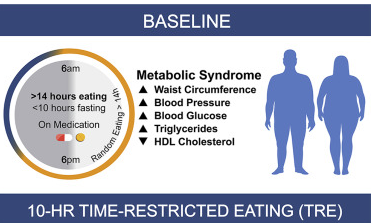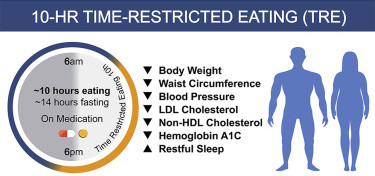 Time-restricted eating (TRE) is a form of intermittent fasting where you eat all of your meals for the day within a restricted window of time. Your eating window could range from 8-10 hours a day (or longer), fasting for the remaining 16 to 14 hours
Time-restricted eating (TRE) is a form of intermittent fasting where you eat all of your meals for the day within a restricted window of time. Your eating window could range from 8-10 hours a day (or longer), fasting for the remaining 16 to 14 hours
Time-restricted eating (aka Intermittent fasting) can provide many important health benefits, from improving your insulin/leptin sensitivity to helping your body more effectively burn fat for fuel.
Recent research found eating all meals between 8 a.m. and 2 p.m. resulted in greater metabolic flexibility, reduced hunger and increased sense of fullness, resulting in weight loss
In another study, an eight-hour time-restricted feeding schedule was found to produce mild caloric restriction and weight loss, without calorie counting
Health Benefits of Time Restricted Eating
Time Restricted Eating(TRE) is showing to have many of the health benefits for fasting (thought milder). I have done a number for 7 day fasts which are profound. However not everyone has the time and lifestyle to allow prolonged health fasts, enter TRE. Three major mechanisms by which fasting benefit your health include:
1. Increased insulin sensitivity and mitochondrial energy efficiency – Fasting increases insulin sensitivity along with mitochondrial energy efficiency, and thereby retards aging and disease, which are typically associated with loss of insulin sensitivity and declined mitochondrial energy.
2. Reduced oxidative stress – Fasting decreases the accumulation of oxidative radicals in the cell, and thereby prevents oxidative damage to cellular proteins, lipids, and nucleic acids associated with aging and disease
3. Increased capacity to resist stress, disease and aging – Fasting induces a cellular stress response (similar to that induced by exercise) in which cells up-regulate the expression of genes that increase the capacity to cope with stress and resist disease and aging.
In animal models, time-restricted eating can prevent and reverse aspects of metabolic diseases. Time-restricted eating in human pilot studies (10 hours) reduces the risks of metabolic diseases in otherwise healthy individuals
Before study

After Study





 Follow me on facebook
Follow me on facebook